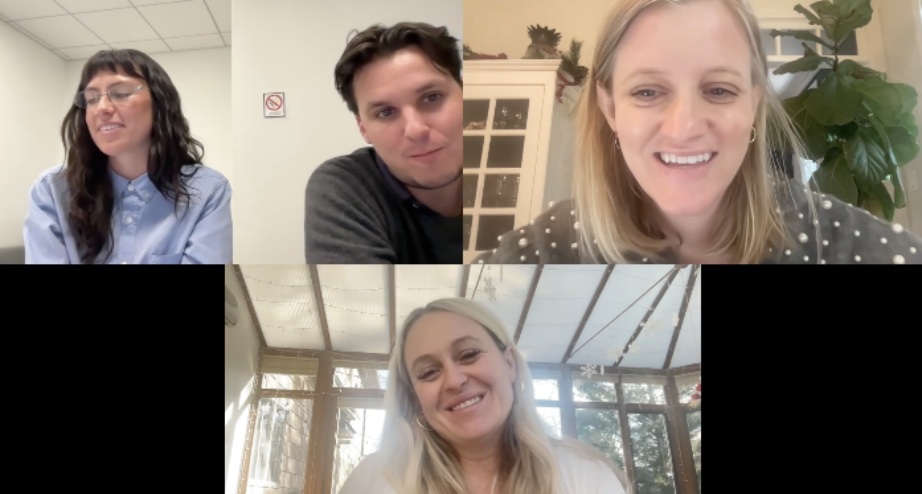Is It Time for a Career Pivot? Here’s What to Consider
Making a creative career pivot can feel risky—but also deeply rewarding. Whether you’re craving more purpose or want to finally pursue your creative side, we'll help you explore why roles like copywriting and art direction offer more than just a paycheck—and how Book180 helps you get there.

Making a career pivot can feel equal parts thrilling and terrifying. On the one hand, you’re finally following that inner voice nudging you toward something more creative, more fulfilling, more you. On the other, you’re staring down uncertainty—leaving behind a familiar path for one that’s less defined and can seem hard to break into.
But here’s the truth: roles like copywriting and art direction offer a rare kind of fulfillment. You get to create things that live in the world—campaigns that make people laugh, think, share, or act. You solve problems with imagination. You tell stories that resonate. It’s work that taps into your curiosity, empathy, and voice—and no two days are the same.
So, is it worth it? Here’s a breakdown of the pros and cons of making a creative career pivot—and how programs like book180 are designed to make the leap more possible than ever.
The Pros: Why People Pivot
1. A Fresh Start in a Field You Actually Love
Maybe you’ve always had a creative streak. You’re the one who loves writing clever Instagram captions, loves choosing paint colors or sketching, dreams up taglines for fake brands, or helps your friends plan events and rewrite their wedding toasts. But somewhere along the way, you chose the safe path: a steady paycheck, a clear title, a job that was “fine.” Over time, though, fine started to feel like stuck.
A pivot into a creative field like copywriting or art direction gives you a shot at doing work that actually energizes you—work that’s clever, visual, strategic, and culturally plugged in. For many students at book180, that’s exactly what sparked their shift.
2. Transferable Skills Are Real
Think you’re starting from zero? Think again. The skills you’ve already built in your current career—writing emails, presenting ideas, problem-solving on deadlines—do carry over. Teachers, marketers, journalists, nonprofit workers, nurses—people from all kinds of backgrounds come into creative roles and thrive. Why? Because creativity is just problem-solving in a different format.
A career pivot doesn’t mean erasing your past—it means reframing your strengths.
Top industry recruiters are looking for unique points of view when hiring creatives. Your past experiences all help make you more marketable.
3. You Can Learn (and Build) While You Work
One of the biggest barriers to making a shift is time. Quitting your job to go back to school for two years? That’s not feasible for most people.
That’s why book180’s online portfolio school is structured for working adults. Our classes are held in the evenings, meaning you can continue working your day job while building your creative portfolio at night. Whether you’re freelancing, working 9 to 5, or parenting/caregiving full-time, you don’t have to put your life on pause to start your next chapter.
Even better? We offer the full curriculum in both Pacific and Eastern Time Zones, so whether you're in New York, Atlanta, Denver, or Los Angeles, there’s a schedule that fits your life—not the other way around.

The Cons: What to Be Ready For
1. It’s Not Instant
Changing careers takes time and patience. Even with a focused, six-month school, there’s no magic shortcut. You’ll need to commit to the process: writing, revising, building a book, and preparing to pitch yourself in a whole new way.
But here’s the upside: unlike a four-year degree, or a traditional, in-person portfolio school, you won’t be waiting years to break in. At a portfolio school like book180, you're learning skills in real time that will directly apply to internships, freelance opportunities, and full-time roles within months—not years.
2. Imposter Syndrome Is Real—But Temporary
Let’s talk about the voice in your head that says: “I’m not a real creative.”
This voice shows up for everyone—even people already working in the industry. The trick isn’t to eliminate self-doubt—it’s to work through it. That’s why mentorship and feedback are built into the book180 experience. You’re not figuring this out alone.
Our instructors and mentors are real working creatives from agencies around the world, who help students navigate the internal stuff as much as the external deliverables. The result? Students not only build a portfolio—they build creative confidence.
How Location Still Matters—Even When You’re Remote
Though book180 is an online portfolio school, we understand that creative culture still has roots in major cities. That’s why we offer built-in support for students across time zones and regions—including those in advertising hubs like Los Angeles, New York and Denver.
If you’re looking for a portfolio school in Los Angeles but don’t want to spend two years and tens of thousands of dollars on housing and tuition, book180 offers the same industry-level training—without uprooting your life. You’ll still connect with mentors and agencies across LA, but you’ll do it on your own terms.
Similarly, if you’re exploring your options near Colorado and searching for a portfolio school in Denver, our online model gives you access to top-tier instructors, national agency connections, and collaborative classmates—all without commuting or relocating.
book180 isn’t bound by geography—but it still speaks the language of the cities where the industry lives and breathes.

Mapping Your Next 6–12 Months: A Practical Roadmap to Launch Your Copywriting Career
So what does the actual pivot look like? Here’s how students typically structure their first year.
Months 1–3:
- Write daily—headlines, captions, ads, even micro stories. Get your voice moving.
- Study great portfolios. Dissect what works and why.
- Take an intro class or copywriting class online to get your feet wet. book180 offers shorter, workshop classes to network with industry creatives and see if this industry is the right fit for you.
Months 4–6:
- Enroll in a program like book180. You’ll start building spec work, collaborating with peers, and getting professional feedback.
- Create 5–6 strong portfolio pieces that show your range and thinking.
- Practice presenting your work—the story behind the idea matters just as much as the copy itself.
Months 7–12:
- Polish your portfolio site. Keep refining.
- Start applying for internships, apprenticeships, and junior roles.
- Tap into creative networks—LinkedIn, Slack groups, virtual portfolio reviews.
- Keep learning, keep writing, and keep showing up.
So... Is Now the Time to Pivot?
There’s no perfect time to reinvent yourself. There’s only now.
The creative industry is evolving, and it needs new voices—voices with life experience, curiosity, and courage. If you’re ready to move toward something more creative, more purposeful, more you—you don’t need a four-year degree to do it. You need a strong portfolio, a smart strategy, and the right support system.
At book180, we’ve helped career pivoters from across the country (and across industries) make the jump. Whether you’re on the East Coast, West Coast, or somewhere in between, our flexible, online format is built for people like you—people who are ready to work, ready to learn, and ready for what’s next.
Want to know how 6 months at book180 compares to 4 years in a traditional program? Explore our curriculum, meet our instructors, and find out why more creatives are skipping the degree—and starting their careers faster.









